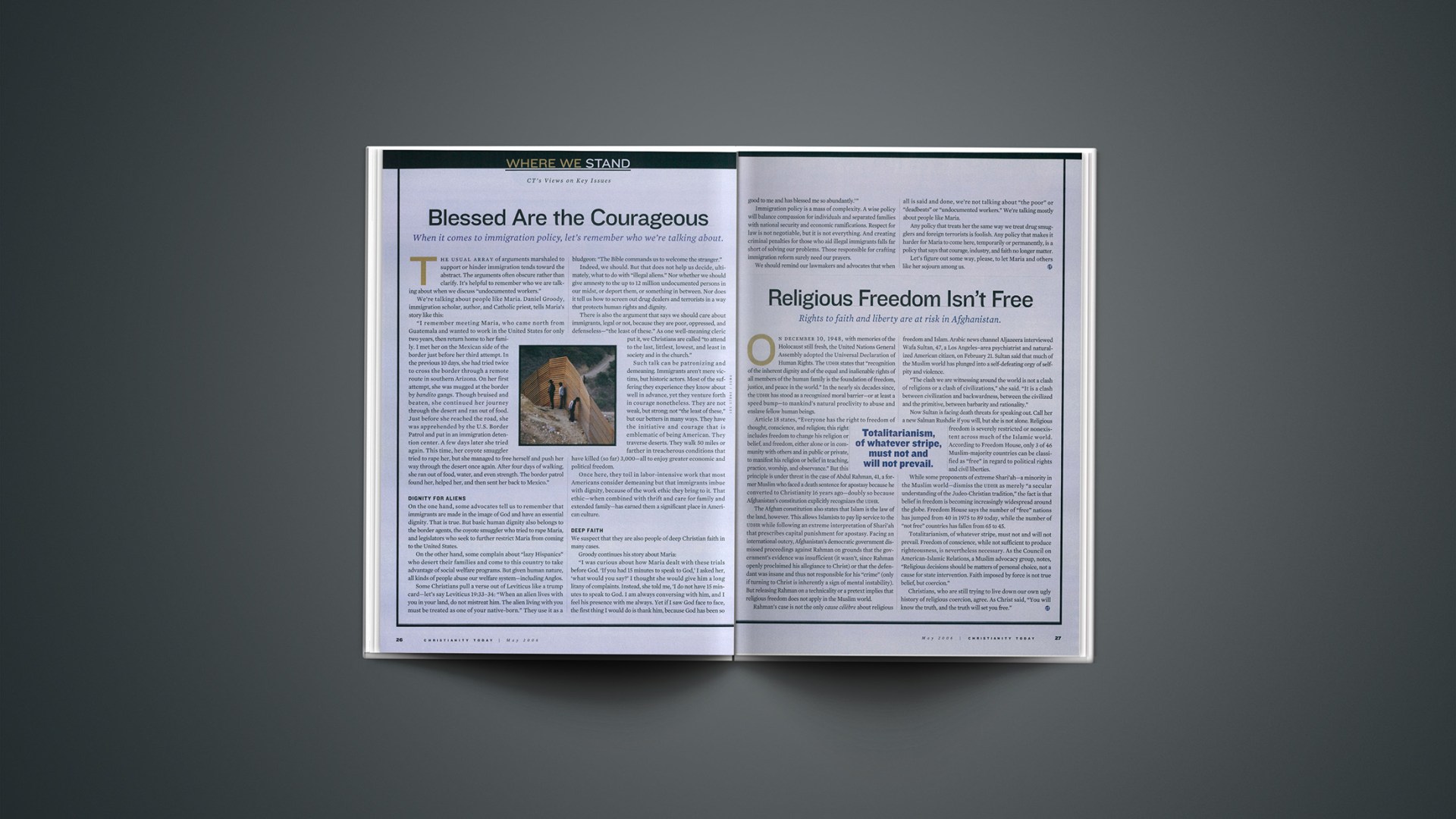On December 10, 1948, with memories of the Holocaust still fresh, the United Nations General Assembly adopted the Universal Declaration of Human Rights. The udhr states that “recognition of the inherent dignity and of the equal and inalienable rights of all members of the human family is the foundation of freedom, justice, and peace in the world.” In the nearly six decades since, the udhr has stood as a recognized moral barrier—or at least a speed bump—to mankind’s natural proclivity to abuse and enslave fellow human beings.
Article 18 states, “Everyone has the right to freedom of thought, conscience, and religion; this right includes freedom to change his religion or belief, and freedom, either alone or in community with others and in public or private, to manifest his religion or belief in teaching, practice, worship, and observance.” But this principle is under threat in the case of Abdul Rahman, 41, a former Muslim who faced a death sentence for apostasy because he converted to Christianity 16 years ago—doubly so because Afghanistan’s constitution explicitly recognizes the udhr.
The Afghan constitution also states that Islam is the law of the land, however. This allows Islamists to pay lip service to the udhr while following an extreme interpretation of Shari’ah that prescribes capital punishment for apostasy. Facing an international outcry, Afghanistan’s democratic government dismissed proceedings against Rahman on grounds that the government’s evidence was insufficient (it wasn’t, since Rahman openly proclaimed his allegiance to Christ) or that the defendant was insane and thus not responsible for his “crime” (only if turning to Christ is inherently a sign of mental instability). But releasing Rahman on a technicality or a pretext implies that religious freedom does not apply in the Muslim world.
Rahman’s case is not the only cause célèbre about religious freedom and Islam. Arabic news channel Aljazeera interviewed Wafa Sultan, 47, a Los Angeles-area psychiatrist and naturalized American citizen, on February 21. Sultan said that much of the Muslim world has plunged into a self-defeating orgy of self-pity and violence.
“The clash we are witnessing around the world is not a clash of religions or a clash of civilizations,” she said. “It is a clash between civilization and backwardness, between the civilized and the primitive, between barbarity and rationality.”
Now Sultan is facing death threats for speaking out. Call her a new Salman Rushdie if you will, but she is not alone. Religious freedom is severely restricted or nonexistent across much of the Islamic world. According to Freedom House, only 3 of 46 Muslim-majority countries can be classified as “free” in regard to political rights and civil liberties.
While some proponents of extreme Shari’ah—a minority in the Muslim world—dismiss the udhr as merely “a secular understanding of the Judeo-Christian tradition,” the fact is that belief in freedom is becoming increasingly widespread around the globe. Freedom House says the number of “free” nations has jumped from 40 in 1975 to 89 today, while the number of “not free” countries has fallen from 65 to 45.
Totalitarianism, of whatever stripe, must not and will not prevail. Freedom of conscience, while not sufficient to produce righteousness, is nevertheless necessary. As the Council on American-Islamic Relations, a Muslim advocacy group, notes, “Religious decisions should be matters of personal choice, not a cause for state intervention. Faith imposed by force is not true belief, but coercion.”
Christians, who are still trying to live down our own ugly history of religious coercion, agree. As Christ said, “You will know the truth, and the truth will set you free.”
Copyright © 2006 Christianity Today. Click for reprint information.
Related Elsewhere:
Also posted today is:
Whose Law in Afghanistan? | High-profile apostasy case highlights legal contradictions.
Weblogfollowed the Rahmancase with comments and links to news articles.
CT covered the problems with Afghanistan’s constitution as it was being drafted.
The U.S. Commission on International Religious Freedom has a comparative study of Muslim constitutions that discusses the variety of ways Muslim countries balance Islam, religious freedom, and church-state separation.
NPR spoke with Richard Land and Rich Cizik about how the case would effect evangelicals’ support for Bush’s foreign policy.
CT’s full coverage of religious freedom and persecution issues is available on our site:
CT’s full coverage on Afghanistan is available on our site.










